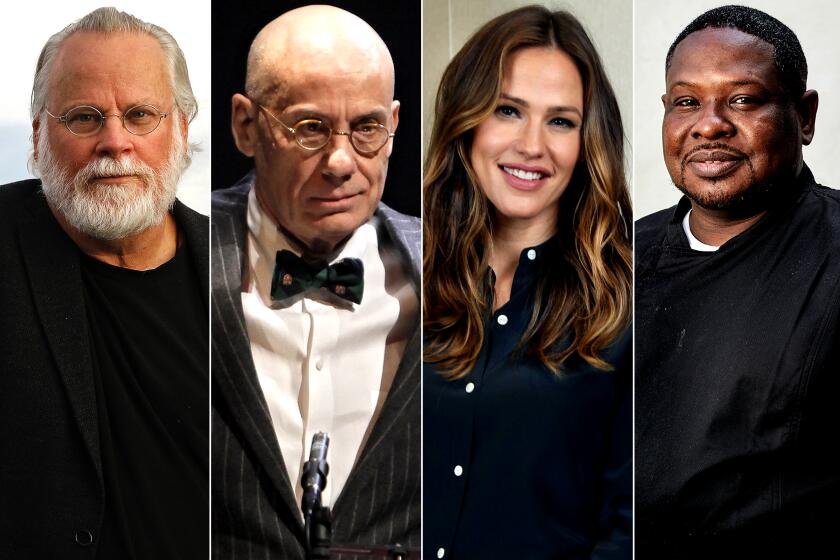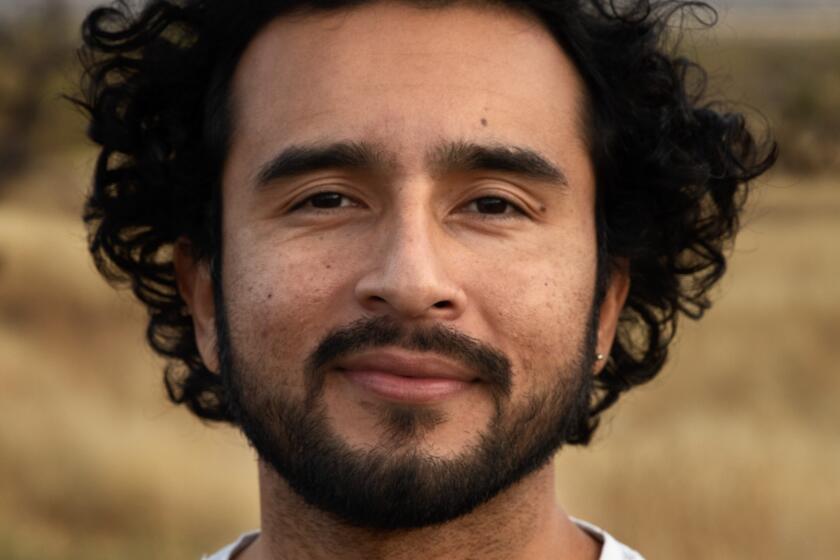Los Angeles Times Book Prizes winners announced
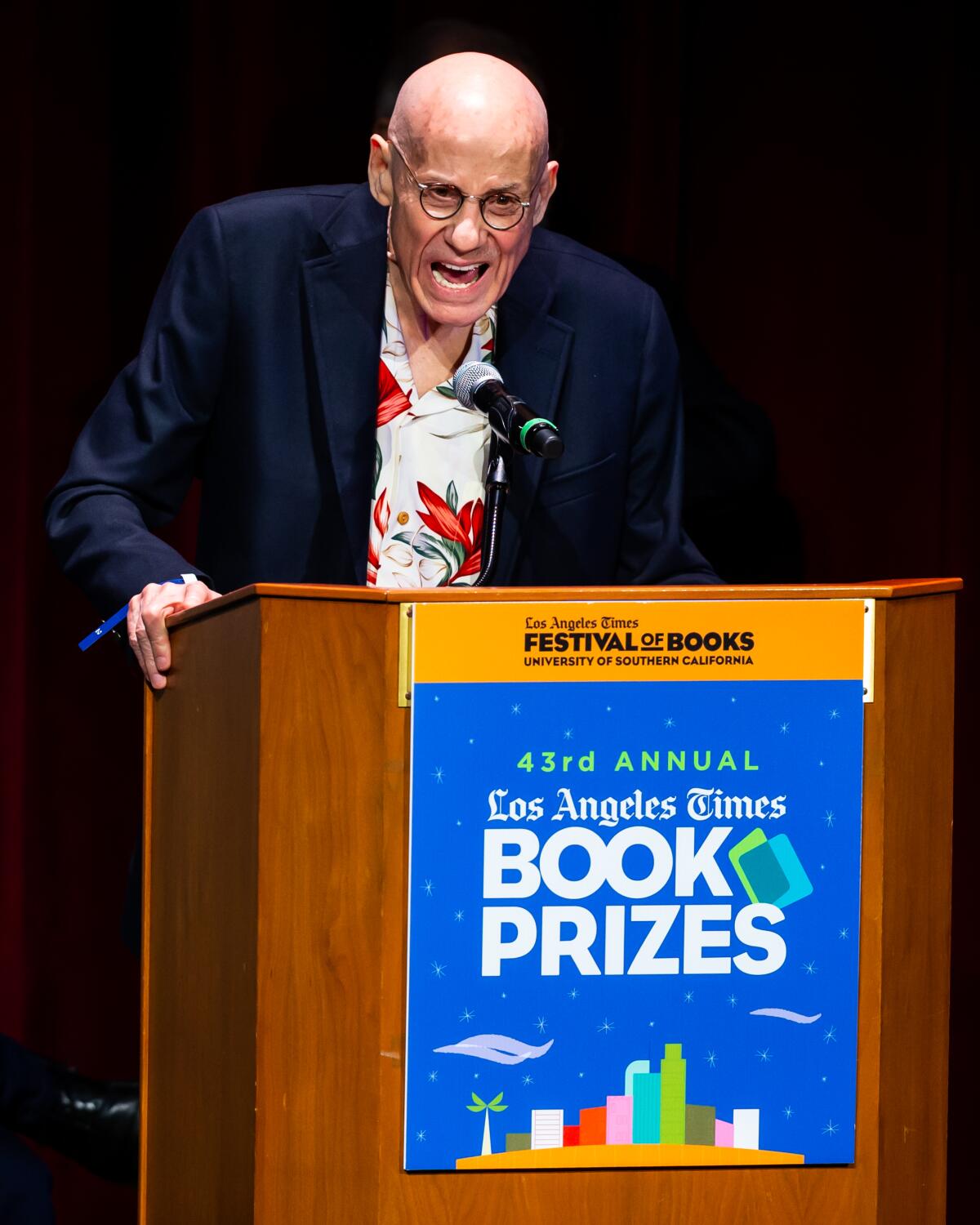
An enigmatic story of art and life in Communist Bucharest, a debut novel set in a red-light district in Pakistan, a searing young-adult story set in Soviet-era Czechoslovakia — as well as reexaminations of J. Edgar Hoover, the Jim Crow era and more — are among the winners of the 43rd Los Angeles Times Book Prizes, awarded Friday evening during a ceremony at USC’s Bovard Auditorium.
Among the winners were widely known historians and journalists, including biography winner Beverly Gage, for “G-Man: J. Edgar Hoover and the Making of the American Century,” which drew on new source material for a fresh look at the notorious FBI director, and Dahlia Lithwick, whose “Lady Justice: Women, the Law, and the Battle to Save America,” won the current interest prize.
In mystery/thriller, Alex Segura — best known as a writer of award-winning comics — won for his retro comic-artist crime novel, “Secret Identity.”
“When I first started this book I thought, ‘Oh, this’ll be easy, I know comics,’” Segura said, before adding that this was the most intense journalistic endeavor of his life.
Other categories helped to boost writers less familiar (at least to American readers). Mircea Cărtărescu took home the fiction prize for “Solenoid,” a Borgesian exploration of life and art in which various monstrous dimensions erupt within Communist Romania.
Festival of Books: A guide to making the most of the book world’s big weekend.
The history prize went to “By Hands Now Known: Jim Crow’s Legal Executioners,” the first book by Margaret A. Burnham,” a law professor and the founder of Northeastern University’s Civil Rights and Restorative Justice Project.
When accepting the award, Burnham dedicated the book to her mother and father: “I thank especially my parents, Dorothy Burnham, now 108 years old, and Lou Burnham who in 1940s had a vision of a global world, a world with peace, who also set their feet in the South and thought, perhaps, that they could change our landscape, that they could change the future for those who have been in enchained and still lived. ... This book is for them, and for us, and for history.”
The Book Prizes ceremony is a prologue to the Los Angeles Times Festival of Books, the nation’s largest literary and cultural festival, which brings together more than 500 writers, musicians, artists and chefs, hundreds of exhibitors and an estimated 150,000 attendees each year.
James Ellroy, best known for his L.A.-based crime novels “L.A. Confidential” and “The Black Dahlia” — and most recently “Widespread Panic” — was honored with the 2022 Robert Kirsch Award for lifetime achievement, an award given to an author whose work focuses on the American West.
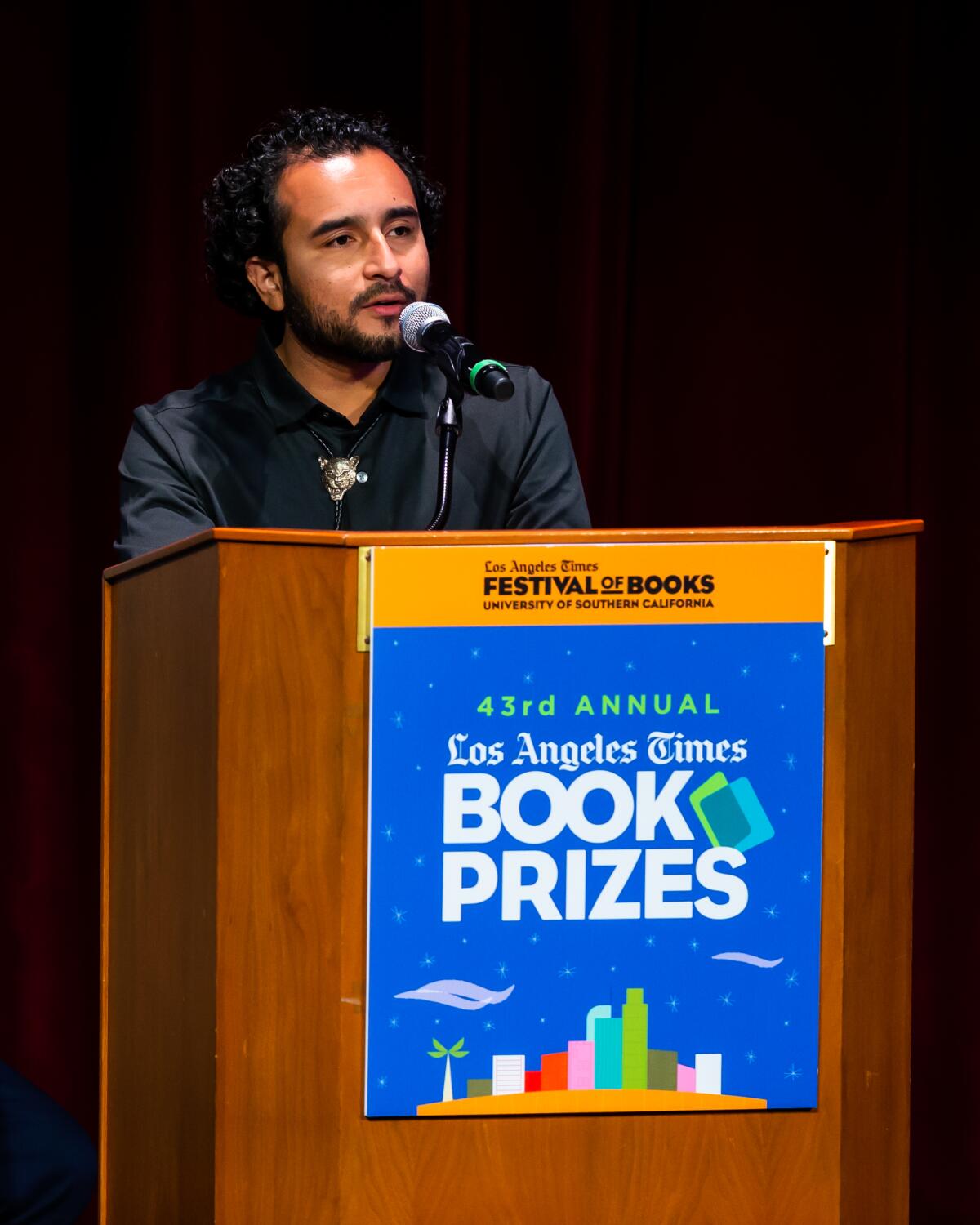
“Yeaaa, you ain’t nobody’s audience but mine, yeaaa,” Ellroy growled into the microphone during his passionate acceptance speech. “I’m from LA, geography is destiny. The film noir epicenter. I lived here, I grew up here. I went to church here, I got in trouble here. But what I did most of all was read books here. In the end I’m just a [dumb] kid who just loves to read.”
The Christopher Isherwood Prize for Autobiographical Prose went to Javier Zamora, whose memoir, “Solito,” recounts his unaccompanied 4,000-mile journey from El Salvador to the United States in 1999, when he was just 9 years old.
“I can’t think of a more fitting prize and a more fitting place to be recognized for my work as a Salvadoran immigrant,” Zamora said after accepting the award. “More than 1 million of us have been displaced by state oppression, racism, homophobia and gender-based violence. When you acknowledge me, you acknowledge all of us.”
Javier Zamora talks about “Solito,” his harrowing memoir about journeying from El Salvador to the U.S. as an unaccompanied 9-year-old.
The 2022 Innovator’s Award went to the Freedom to Read Foundation, recognizing its work in protecting the public’s right to access information in libraries and helping provide legal counsel to librarians fighting to preserve their 1st Amendment rights. The foundation has also been active in documenting and opposing the current nationwide wave of book bans plaguing the country.
Peter Coyl, president of the Freedom to Read Foundation, accepted the award with a fervent call to arms. He began by citing the fact cited that more than 1,200 books were challenged last year in efforts to remove them from libraries, “a 713% increase over the last two years.”
“Librarians are being harassed, threatened and fired,” he said. “Whether it is a history of racial oppression in America or books on the human sexual experience, every person in this country has a right to find that information in their local library, unfettered by shame.
“I issue a challenge — do not be silent. Now is not the time to be complacent,” Coyl added. “The right to read freely is an American right. Let that be known.”
Your ultimate L.A. Bookhelf is here — a guide to the 110 essential L.A. books, plus essays, supporting quotes and a ranked list of the best of the best.
Jamila Rowser and Robyn Smith won the graphic novel/comic prize for “Wash Day Diaries,” a tribute to Black joy that follows four best friends living in the Bronx. Accepting the award on behalf of both winners, Rowser said she believes she and Smith are the first Black women to have even been nominated for this award. “We shouldn’t have to prove books like ‘Wash Day Diaries’ should be published, so I hope this will pave the way for more comics like ours.”
The poetry prize was awarded to Dionne Brand for “Nomenclature: New and Collected Poems” a collection which displays “Brand’s ongoing body of thought—trenchant, lyrical, assonant, discordant, and meaning-making,” according to the judges’ citation.
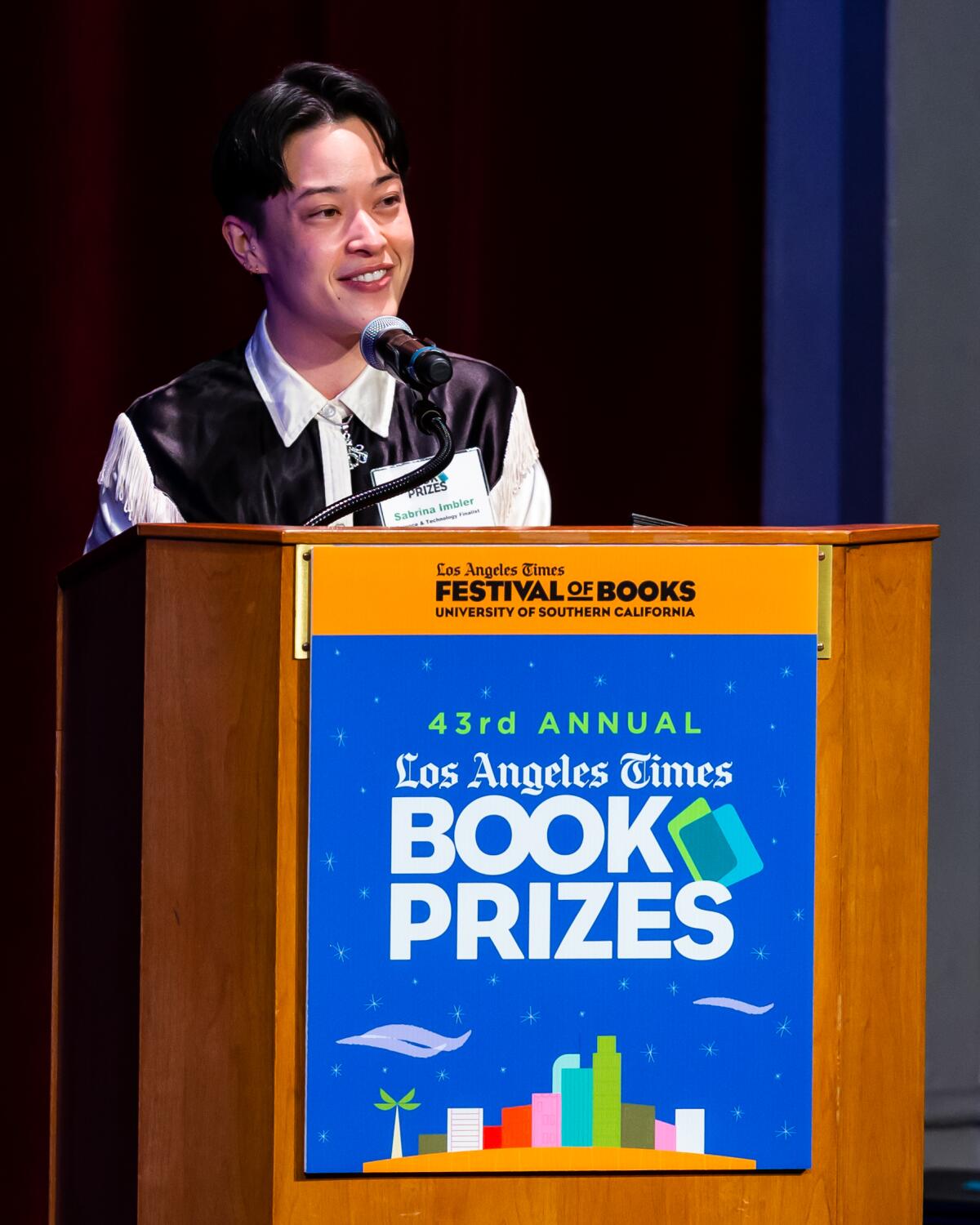
In science and technology, Sabrina Imbler was honored for “How Far the Light Reaches: A Life in Ten Sea Creatures,” which explores themes of survival and sexuality, community and care, while weaving the extraordinary world of marine biology with the author’s personal account of family and relationships.
“Writing this book helped me come out as trans, which I can’t recommend enough,” Imbler joked, before adding that we’re living in a time when the trans and queer community is under siege. “The ocean proves that changing sex is the most natural thing in the world. If you don’t believe me ask a clown fish.”
“Spear,” Nicola Griffith’s “queer Arthurian masterpiece for the modern era,” earned the Ray Bradbury Prize for Science Fiction, Fantasy & Speculative Fiction, while the Art Seidenbaum Award for First Fiction prize went to Aamina Ahmad’s “The Return of Faraz Ali,” in which a young girl meets a violent death in Lahore’s red-light district. Ahmad’s debut poses and explores the question “Whom do we choose to protect, and at what price?”
“Widespread Panic,” Ellroy’s latest novel, trades political intrigue for hardcore 1950s gossip via the confessions of real-life lowlife Fred Otash.
In YA literature, judges awarded another work on youth and sacrifice: Lyn Miller-Lachmann for “Torch,” which follows three teens in 1969 Czechoslovakia as they struggle to survive in the wake of their friend’s self-immolation.
See the full list of finalists and winners below.
Biography
Tomiko Brown-Nagin, “Civil Rights Queen: Constance Baker Motley and the Struggle for Equality”
Beverly Gage, “G-Man: J. Edgar Hoover and the Making of the American Century”
Jennifer Homans, “Mr. B: George Balanchine’s 20th Century”
David Maraniss, “Path Lit by Lightning: The Life of Jim Thorpe”
Robert Samuels and Toluse Olorunnipa, “His Name Is George Floyd: One Man’s Life and the Struggle for Racial Justice”
Fiction
Mircea Cărtărescu, “Solenoid” (translation by Sean Cotter)
Anna Dorn, “Exalted”
James Hannaham, “Didn’t Nobody Give a S— What Happened to Carlotta”
Jamil Jan Kochai, “The Haunting of Hajji Hotak and Other Stories”
Fernanda Melchor, “Paradais” (translation by Sophie Hughes)
Graphic novels/comics
Alex Graham, “Dog Biscuits”
Yamada Murasaki, “Talk to My Back” (translation by Ryan Holmberg)
Tommi Parrish, “Men I Trust”
Jamila Rowser and Robyn Smith, “Wash Day Diaries”
Noah Van Sciver, “Joseph Smith and the Mormons”
History
Margaret A. Burnham, “By Hands Now Known: Jim Crow’s Legal Executioners”
Hugh Eakin, “Picasso’s War: How Modern Art Came to America”
Kerri K. Greenidge, “The Grimkes: The Legacy of Slavery in an American Family”
Andrew M. Wehrman, “The Contagion of Liberty: The Politics of Smallpox in the American Revolution”
Donald Yacovone, “Teaching White Supremacy: America’s Democratic Ordeal and the Forging of our National Identity”
Mystery/thriller
Rachel Howzell Hall, “We Lie Here”
Laurie R. King, “Back to the Garden”
Tracey Lien, “All That’s Left Unsaid”
Alex Segura, “Secret Identity”
Peng Shepherd, “The Cartographers”
Poetry
Dionne Brand, “Nomenclature: New and Collected Poems”
James Cagney, “Martian: The Saint of Loneliness”
Marwa Helal, “Ante body”
Cynthia Parker-Ohene, “Daughters of Harriet: Poems”
Solmaz Sharif, “Customs: Poems”
Science & technology
Juli Berwald, “Life on the Rocks: Building a Future for Coral Reefs”
Jessica Hernandez, “Fresh Banana Leaves: Healing Indigenous Landscapes Through Indigenous Science”
Sabrina Imbler, “How Far the Light Reaches: A Life in Ten Sea Creatures”
James Vincent, “Beyond Measure: The Hidden History of Measurement From Cubits to Quantum Constants”
Ed Yong, “An Immense World: How Animal Senses Reveal the Hidden Realms Around Us”
The Art Seidenbaum Award for First Fiction
Aamina Ahmad, “The Return of Faraz Ali”
Maayan Eitan, “Love”
Sidik Fofana, “Stories from the Tenants Downstairs”
Oscar Hokeah, “Calling for a Blanket Dance”
Morgan Thomas, “Manywhere: Stories”
The Ray Bradbury Prize for Science Fiction, Fantasy & Speculative Fiction
Sara Gran, “The Book of the Most Precious Substance”
Nicola Griffith, “Spear”
Alex Jennings, “The Ballad of Perilous Graves”
Ray Nayler, “The Mountain in the Sea: A Novel”
George Saunders, “Liberation Day: Stories”
Young-adult literature
Samira Ahmed, “Hollow Fires”
Lyn Miller-Lachmann, “Torch”
Sabaa Tahir, “All My Rage”
Andrew Joseph White, “Hell Followed With Us”
Kip Wilson, “The Most Dazzling Girl in Berlin”
Current interest
Anand Giridharadas, “The Persuaders: At the Front Lines of the Fight for Hearts, Minds, and Democracy”
Sarah Kendzior, “They Knew: How a Culture of Conspiracy Keeps America Complacent”
Dahlia Lithwick, “Lady Justice: Women, the Law, and the Battle to Save America”
Luke Mogelson, “The Storm is Here: An American Crucible”
Dorothy Roberts, “Torn Apart: How the Child Welfare System Destroys Black Families — and How Abolition Can Build a Safer World”
More to Read
Sign up for our Book Club newsletter
Get the latest news, events and more from the Los Angeles Times Book Club, and help us get L.A. reading and talking.
You may occasionally receive promotional content from the Los Angeles Times.
